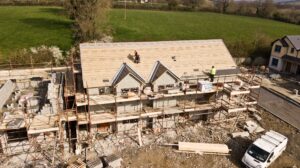
Everything You Need to Know About Residential Building Permits
Whether building a home from scratch or performing a sizable renovation project, you’ll likely need to obtain one or more building permits. Residential building permits are often necessary when completing a construction project. When you apply for a permit, the planning department in your city determines if the project you intend to complete is legal.
You’ll need to provide comprehensive building plans and documentation to ensure the planning department has everything necessary to verify that your project is up to code. The purpose of residential building permits is to ensure the structure’s safety.

Understanding these permits is essential for homeowners and contractors alike. As a homeowner, any project that involves converting, moving, or demolishing a structure needs a permit. If you don’t obtain the proper license, you may be required to tear the work down. Remember that most lenders will only provide loans for homes with unpermitted work, so completing a project with a permit could make it easier for you to sell your property.
Contractors need to obtain permits to ensure their work is legal. This guide answers the question, “What is a residential permit?” and offers a step-by-step guide on how to apply for one.
Definition of Residential Building Permit
A residential building permit allows you to demolish, move, enlarge, repair, alter, or construct a building that only contains dwelling units for independent living. These permits can also be applied to accessories to dwelling units, including storage buildings and detached garages. The county or city issues all residential building permits.
In California, residential building permits are required for new construction projects, major renovations, or additions to preexisting structures. However, each jurisdiction can have slightly different definitions of these permits and the legal documents you must fill out. This type of building permit legally authorizes construction or renovation projects on residential structures.
Scope of Residential Building Permits
There are many types of activities that a residential building permit can cover, which include the following:
- Building a new structure from scratch
- Demolishing part or all of a building
- Adding a room, which involves expanding the floor plan
- Making major repairs
- Performing significant alterations
When you apply for this permit, the planning agency in charge of the permitting process will ensure that your project meets all local, state, and federal zoning laws. They want to make sure that you’ll meet standards regarding:
- Structural integrity
- Industrial waste
- Proper exiting
- Fire resistance
- Extension of electrical service
- Sewer and water lines
The types of structures that are covered by a permit include the following:
- Accessory structures
- Additions
- Dwellings for independent living
Exclusions and Limitations
While residential building permits cover most significant projects, they are only some-encompassing. You don’t need to obtain a permit if you’re completing a smaller project that isn’t altering the structure. The types of projects that don’t need a permit include the following:
- Countertop replacement
- Painting
- Floor sheathing repairs
- Floor finishes, including tile and carpet
- Decorative tile installations
- Cabinet replacement or refacing that doesn’t require changing the plumbing or walls
- Appliance repairs
- Electrical outlet and switch replacements
- Electrical fuse and circuit breaker replacements
- Roof repairs
- Roof replacements that apply to less than 25% of the existing structure
- Awning installation
- Window replacements
- Walkways and driveways that don’t cross over a basement and aren’t more than 30 inches above grade
- Detached accessory structures that are 120 square feet or less
- Cleaning stoppages in pipes, fixtures, and valves
- Stopping leaks in vent pipes, soil, or drains
Working on a significant project may require more than a residential building permit. If your project involves mechanical, plumbing, or electrical systems, you must apply for permits specific to these aspects of the construction process.

Types of Residential Dwellings Covered
Numerous types of residential dwellings are included in a residential building permit. However, whether or not a permit is required depends on the project’s scope and local zoning laws. A new construction home will need a residential building permit in most scenarios. A permit is necessary whether you’re constructing a single-family detached home or condominium. The primary properties that are included with residential building permit requirements include the following:
- Single-family detached dwellings are freestanding residential buildings that don’t share walls with other properties. In most situations, the homeowner usually owns the land and the building.
- Single-family attached dwellings: A single-family attached building refers to a housing unit connected directly to another unit. This type of dwelling often includes a shared wall.
- Condominiums: A condo is a building comprising individual units, similar to a multifamily property. The main difference, however, is that condos are wholly owned by the residents. Condo owners can build equity with their mortgage payments.
- Townhouses: A townhouse is a multi-floor home with a kitchen space, entrance, and bathroom. However, these homes share multiple walls with neighbors unless they are situated at the side of a building.
- Apartments for permanent habitation: An apartment is an individual unit within a multifamily building. Landlords rent out units to tenants.
A residential building permit covers all these properties. The types of projects that require a license in these buildings include the following:
- Building a new home
- Adding a swimming pool that stores more than 5,000 gallons of water
- Building a large shed, barn, or garage
- Installing a new fireplace
- Removing or adding walls
- Finishing a basement
- Completing a large excavation project

Importance of Residential Building Permits
As mentioned, homeowners and contractors benefit from obtaining a residential building permit. If you’re renovating your property, obtaining a permit ensures that your work is legal, allowing you to sell your home without encountering any roadblocks. Contractors also want to make sure that their work meets local building codes. Without a permit, the city could tell them to tear down any work they’ve done.
Obtaining a residential building permit ensures compliance with local building codes and zoning regulations and protects against potential legal and financial liabilities. Keep in mind that homeowners and contractors will be held liable. In California, contractors can pay as much as $5,000 per violation and may be subject to serious disciplinary action. Homeowners can be fined up to $500 per day.
Process of Obtaining a Residential Building Permit
To obtain a residential building permit, make sure you adhere to the following application submission requirements:
- Step 1: Apply along with any pertinent documents, which include building and site plans, maps, photographs, and architectural designs.
- Step 2: The city or county will review your plans and documents to ensure they comply with building codes.
- Step 3: You’ll be given the legal go-ahead to perform the construction process, meaning a permit will be issued.
- Step 4: The city will perform regular inspections to ensure the work adheres to your building plans.
- Step 5: A final inspection will occur once all permitted work is finished.
Residential Building Permit Fees
You’ll need to pay some fees to obtain a residential building permit, which you can calculate with LADBS. Permitting is a cost. However, many factors can impact your costs, including the size and location of the project. Fees can range from $50 to $2,000. If you hire a contractor to perform this work, they’ll likely obtain the necessary permits on your behalf.
Conclusion
Residential building permits are essential to the success of most construction projects. With a license, your work will be legal. The consequences of having unpermitted work on your property include everything from fines to being told to tear down all the work you’ve done.
Whether you’re a homeowner planning a renovation or a contractor wanting to start working on another project, seek the proper permits before the construction process begins. Understanding the definitions and scope of residential building permits is essential for successful project management.

Jason Somers, President & Founder of Crest Real Estate
With over 15 years of professional experience in the Los Angeles luxury real estate market, Jason Somers has the background, judgement and track record to provide an unparalleled level of real estate services. His widespread knowledge helps clients identify and acquire income producing properties and value-ad development opportunities.
Learn more about Jason Somers or contact us.



